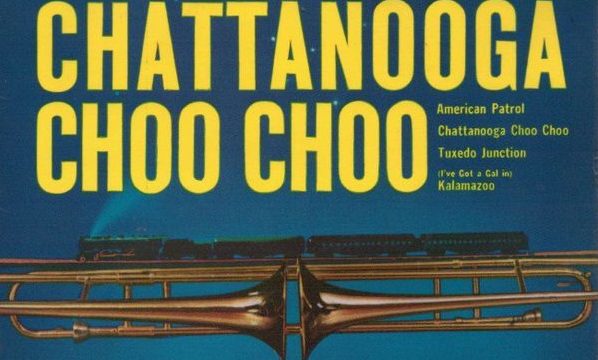Before America had car culture, it had the train.
Southern states blocked railway expansion until the Civil War, but after the conflict, change happened fast. The first transcontinental railroad was completed in 1869. For many years afterward, the easiest way to travel cheaply and affordably was by train. The railroad brought passengers to cities, carried the mail, and provided reliable, pensioned employment for generations of African-American men, helping fuel the Great Migration.
The train was more than a way to travel; it fueled permanent cultural change.
And just like the automobile, the train found its way into pop culture.
In its most famous version, Glenn Miller’s swinging arrangement, “Chattanooga Choo Choo” starts out with the bright, positive spark of an open journey. The shoeshine boy will help you to the right track, and you can go from New York down all the way to Tennessee. Harry Warren and Mack Gordon, the songwriting team behind “At Last,” created a song with clever lyrics and the ability to swing.
But the swing didn’t happen without Glenn Miller.
Miller was a Big Band legend, the dominant chart-topper from 1939–42, and the only recording artist to score 16 number-one records and 69 top ten hits in just four years. His singles, including instant classics “In the Mood” and “Moonlight Serenade” still evoke their era. Miller was derided in his time (and sometimes even now) as “too commercial,” but he had plenty of defenders, and Louis Armstrong carried his recordings when he went on tour.
“Chattanooga Choo Choo”’s orchestration might be gimmicky, but it’s effective. The horns mimic railway whistles, echoing the lyrics. Cab Calloway and his orchestra also made a damn fine recording of the song (with a slyer, better vocal), but they don’t put you on the train the same way Miller’s arrangement does. “Chattanooga Choo Choo” was so successful that it became the first gold record in history, selling 1.2 million copies.
Other covers include Bill Haley and the Comets, and even Barry Manilow singing over Miller’s orchestration.
Sun Valley Serenade, the debut of “Chattanooga Choo Choo,” was one of only two movies where Miller appeared with his orchestra (though Miller himself appeared in several others). Just a year later, Miller would volunteer for the United States Armed Services, leading the Army Air Force Band. He and two other officers disappeared over the English Channel in December 1944, and the plane was never found.
His legacy continued, of course, his orchestrations adding vintage flavor to historical movies and still being played at parties. The Army Air Force Band was disbanded, but was eventually reconstituted, and led to the performing military bands that continue in the United States to this day. And who knows? With the election of Joe Biden, perhaps the country will begin to embrace train travel again. Everything comes around again, sooner or later.
Bonus track: If you know the lyrics are familiar and can’t remember why, the answer is Young Frankenstein.


